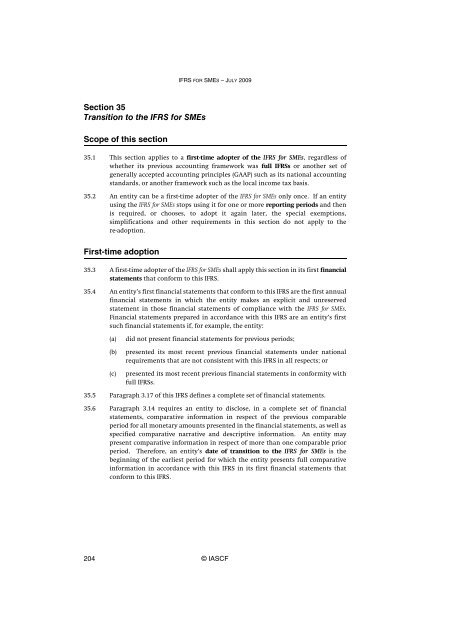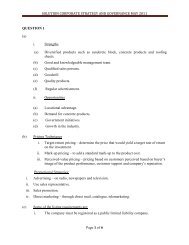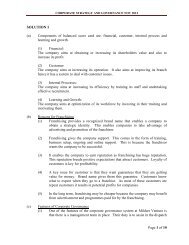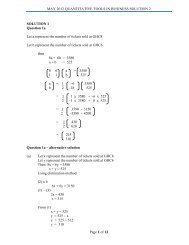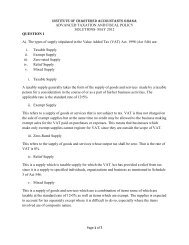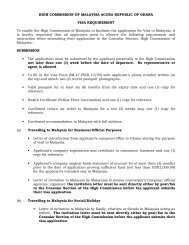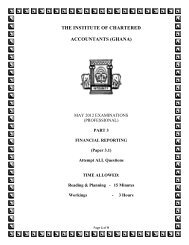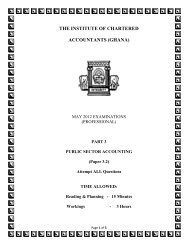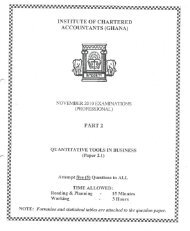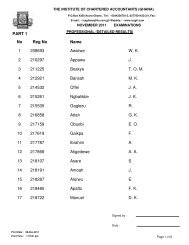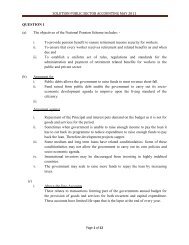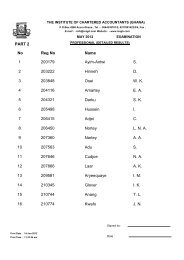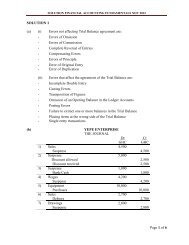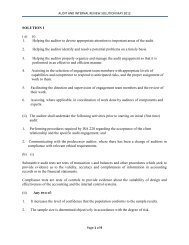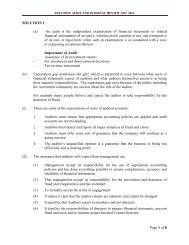(IFRS) for Small and Medium-sized Entities (SMEs)
(IFRS) for Small and Medium-sized Entities (SMEs)
(IFRS) for Small and Medium-sized Entities (SMEs)
You also want an ePaper? Increase the reach of your titles
YUMPU automatically turns print PDFs into web optimized ePapers that Google loves.
<strong>IFRS</strong> FOR SMES – JULY 2009Section 35Transition to the <strong>IFRS</strong> <strong>for</strong> <strong>SMEs</strong>Scope of this section35.1 This section applies to a first-time adopter of the <strong>IFRS</strong> <strong>for</strong> <strong>SMEs</strong>, regardless ofwhether its previous accounting framework was full <strong>IFRS</strong>s or another set ofgenerally accepted accounting principles (GAAP) such as its national accountingst<strong>and</strong>ards, or another framework such as the local income tax basis.35.2 An entity can be a first-time adopter of the <strong>IFRS</strong> <strong>for</strong> <strong>SMEs</strong> only once. If an entityusing the <strong>IFRS</strong> <strong>for</strong> <strong>SMEs</strong> stops using it <strong>for</strong> one or more reporting periods <strong>and</strong> thenis required, or chooses, to adopt it again later, the special exemptions,simplifications <strong>and</strong> other requirements in this section do not apply to there-adoption.First-time adoption35.3 A first-time adopter of the <strong>IFRS</strong> <strong>for</strong> <strong>SMEs</strong> shall apply this section in its first financialstatements that con<strong>for</strong>m to this <strong>IFRS</strong>.35.4 An entity’s first financial statements that con<strong>for</strong>m to this <strong>IFRS</strong> are the first annualfinancial statements in which the entity makes an explicit <strong>and</strong> unreservedstatement in those financial statements of compliance with the <strong>IFRS</strong> <strong>for</strong> <strong>SMEs</strong>.Financial statements prepared in accordance with this <strong>IFRS</strong> are an entity’s firstsuch financial statements if, <strong>for</strong> example, the entity:(a)(b)(c)did not present financial statements <strong>for</strong> previous periods;presented its most recent previous financial statements under nationalrequirements that are not consistent with this <strong>IFRS</strong> in all respects; orpresented its most recent previous financial statements in con<strong>for</strong>mity withfull <strong>IFRS</strong>s.35.5 Paragraph 3.17 of this <strong>IFRS</strong> defines a complete set of financial statements.35.6 Paragraph 3.14 requires an entity to disclose, in a complete set of financialstatements, comparative in<strong>for</strong>mation in respect of the previous comparableperiod <strong>for</strong> all monetary amounts presented in the financial statements, as well asspecified comparative narrative <strong>and</strong> descriptive in<strong>for</strong>mation. An entity maypresent comparative in<strong>for</strong>mation in respect of more than one comparable priorperiod. There<strong>for</strong>e, an entity’s date of transition to the <strong>IFRS</strong> <strong>for</strong> <strong>SMEs</strong> is thebeginning of the earliest period <strong>for</strong> which the entity presents full comparativein<strong>for</strong>mation in accordance with this <strong>IFRS</strong> in its first financial statements thatcon<strong>for</strong>m to this <strong>IFRS</strong>.204 © IASCF


